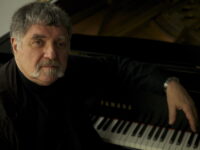Feature photo: Maxim Schulz
John Scofield made his first record in 1977 and following stints with Chet Baker/Gerry Mulligan, Billy Cobham and Miles Davis, he had steadily worked his way up to the top of the jazz guitarist heap. All along, he regularly defied tidy categorization by delving into just about every nook and cranny of jazz and even music in general, usually excelling in undertaking whatever music style he chose to play. He’s also led or co-led bands of widely varying formats. But John Scofield had never made a solo guitar record, until now.
His debut album – now titled East Meets West, was originally self-titled, which is how first releases are often named because they are intended to introduce the artist to the world. The second John Scofield seems to introduce to the world this seventy-year-old guitarist, unaccompanied, for the first time.
I should rather say, “unaccompanied by others.” On most tracks, the master plectrist is heard playing two guitars (one rhythm and one lead) using a loop machine to overdub in real time.
John Scofield is, obviously, a marked departure from anything Scofield has done previously in some respects, including his most recent album that marked the beginning of his tenure with ECM Records, Swallow Tales (highly recommended, by the way). His assortment of material and the way he handles them reveals more about this well-established artist than probably any interview can. He’s figuratively writing his signature in blood, whether he’s playing his own numbers or someone else’s.
Time On My Hands (1990) and Grace under Pressure (1991) represent a couple of Scofield’s best batches of originals, so it’s great to see those albums represented here. “Honest I Do” – from the latter release and stripped of its stately small horn chart – has all the intimacy only suggested on the earlier portrayal. The solo starts out a little wobbly before settling into a nice, warm disposition. “Since You Asked” from the earlier LP is similar in its melancholy, but Sco opts out of looping over himself in the solo section, and almost offhandedly handles both the lead and rhythm chores while piloting through his neatly braided melody. “Mrs. Scofield’s Waltz,” from the superb Works For Me (2001) is also cut from the same cloth, but this one was probably the most destined to be played solo, the strain stands so strongly on its own. The feel here is exactly the same but the looped rhythm guitar is the only accompaniment and really, the only accompaniment needed.
“Elder Dance” is one of only two songs debuting on this album, a blues-jazz workout that gives Scofield room to stretch out. The other, “Trance De Jour,” is a dive into the avant-garde harmonics of the 60s while also being his funkiest entry on this record.
Scofield choices of the other tunes provide a glimpse into music that’s endeared with him throughout the years. His take on “It Could Happen To You” is not of the variety of former boss Chet Baker but rather, Kenny Dorham. Sco swings and plays seemingly all the hallmarks of his singular guitar language before undertaking an unexpected, temporary key change. “Coral” is a Keith Jarrett composition that Gary Burton has made his own, and as a past member of Burton’s band, Scofield undoubtedly picked up his appreciation of the song from there and he gives it reverential treatment.
As a teenager in the late 60s, Scofield was into rock but his selections of non-jazz songs go back to the 50s and before. Scofield’s affinity for country had always been hiding in plain sight (and made explicit on 2016’s Country For Old Men), and his treatment of Hank Williams’ “You Win Again” is flawless. Buddy Holly’s swaggering “Not Fade Away” honors Holly’s innovative rhythm guitar sway complemented with single-line tones and patterns that’s all Scofield and midway through, a faux bass bit is tossed in. And then there’s the ultimate sentimental ballad “Danny Boy,” fingerpicked with affection and discreet tastefulness. The modern device of backward looping only serves to bring out more of the song’s Celtic heritage.
With a recording career stretching back to the early 70s, we think we know a lot about the style and finesse of John Scofield. John Scofield shows that in stripping down the arrangements to just his parts, there remains a lot of him left to uncover.
John Scofield is now available from ECM Records.




